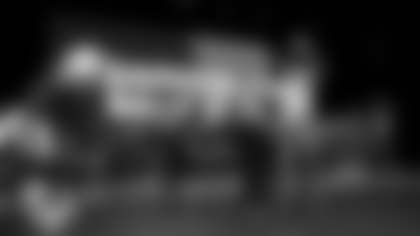Irv Cross was a fixture in professional football for decades as a player, a coach, and a pioneering broadcaster, but he almost didn't survive his first Training Camp with the Eagles in 1961.
Cross, who died Sunday at age 81, was a seventh-round draft pick from Northwestern, a long shot to make the roster of the defending NFL Champions. Although he played both ways at Northwestern for coach Ara Parseghian, he primarily played running back and wide receiver. The Eagles' coaches made him a permanent defensive back. The rookie was initially overmatched.
"The first practice I was going against Tommy McDonald," Cross said, referring to the Eagles' Hall of Fame receiver. "Tommy came at me, faked to the inside and, whoosh, he was gone. I was 30 yards away from him when he caught the ball. They put me on the other side and Pete (Retzlaff) ran a short pattern. I went for him and, whoosh, he was off in another direction catching the ball.
"I said to myself, 'If this is what I have to go through, I might as well quit.'"
The Eagles' coaches stayed with Cross and he took over for Tom Brookshier when Brookshier suffered a career-ending leg injury midway through the 1961 season. Losing Brookshier was a blow – he was one of the league's best cornerbacks and a team leader – but given the opportunity, Cross became a Pro Bowl player himself.
He had great physical tools. He had size (6-2, 190 pounds) and speed (he was a sprinter and hurdler in college) and a great work ethic. He brought film home every night and studied the league's receivers. He kept detailed notes on their strengths and weaknesses and what they liked to do in certain situations. He once said, only half-joking, "I think I know the routes better than they do."
Because he did not play defense extensively in college Cross had to learn tackling fundamentals at the NFL level, which is both difficult – and dangerous. Initially, he launched himself at his opponent's knees, often leading with his head. As a result, he suffered several severe concussions early in his career.
Today, of course, there is more awareness about the long-term effects of concussions. Indeed, Cross was diagnosed with cognitive dementia several years ago and agreed that after his death, his brain would be donated to medical researchers so it could be studied for CTE, the brain disease that has affected many former players.
Cross was fitted with a specially padded helmet – it looked like a leather helmet from the 1930s – and that combined with better tackling technique allowed him to play nine seasons in the NFL. He was traded to the Los Angeles Rams in 1966, part of a roster purge by Coach-General Manager Joe Kuharich, but he was reacquired by the Eagles in 1969 when Kuharich was fired and replaced by Jerry Williams.
When Cross rejoined the team, Williams made him a player-coach, a rarity in the modern NFL. The Eagles have not had one since. Cross told Retzlaff, then the team's general manager, about Harold Jackson, a young receiver languishing on the Rams' taxi squad.
"I went against him every day in practice and I couldn't cover him," Cross said. "All he needs is a chance to play."
On Cross' recommendation, Retzlaff traded fullback Izzy Lang to the Rams for the 5-10, 170-pound Jackson. In his first season with the Eagles, Jackson caught 65 passes for a league-leading 1,116 yards and nine touchdowns.
In 1970, Cross retired as a player and became a full-time coach. One year later, he was hired by CBS as a game analyst and in 1975, he moved to the studio when the network launched THE NFL TODAY, the weekly pregame show that became the model for the panel shows that now dominate sports television.
THE NFL TODAY was hosted by Brent Musburger, a former Chicago sports writer, with Phyllis George, a former Miss America, doing warm and fuzzy features and Jimmy (the Greek) Snyder talking about the betting line. Cross provided the expert analysis, breaking down the X's and O's, and previewing the big games. He was a pioneer, the first African-American network sports show anchor.
"No one knew if it work," Cross said, discussing the show years later. "It was the first live pregame show. All the previous pregame shows were taped. There were technical concerns – what if we lost the signal, what if there was a slip-up – but there was just something exciting about Brent signing on with, 'You are looking live at Giants Stadium,' or whatever. It clicked right away."
THE NFL TODAY was a huge success and Cross, with his knowledgeable and likable presence, helped make it so. In 2009, he was the first Black recipient of the Pete Rozelle Award for long and distinguished coverage of the NFL on TV and radio coverage. Cross' name was added to the media honor roll at the Pro Football Hall of Fame in Canton, Ohio.
In a statement, CBS Sports Chairman Sean McManus said: "Irv was a true gentleman and a trailblazer in the sports television industry and will be remembered for his accomplishments and the paths he paved for those who followed."
An award-winning writer and producer, Ray Didinger was inducted into the Pro Football Hall of Fame in 1995. He has also won six Emmy Awards for his work as a writer and producer at NFL Films. The five-time Pennsylvania Sportswriter of the Year is a writer and analyst for NBC Sports Philadelphia. Didinger will provide Eagles fans a unique historical perspective on the team throughout the year for PhiladelphiaEagles.com. You can read all of his Eagles History columns here. He is also the author of The Eagles Encyclopedia: Champions Edition which is in bookstores now.














